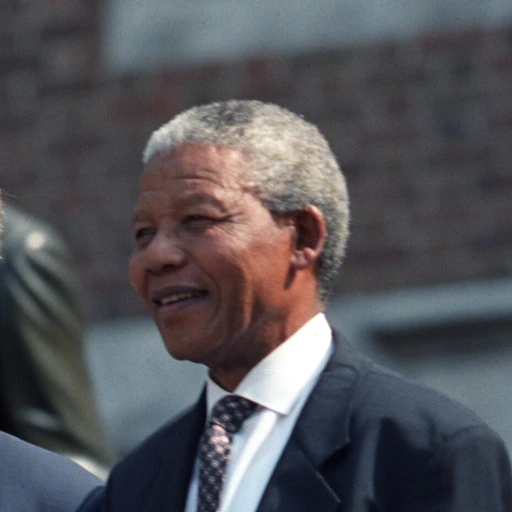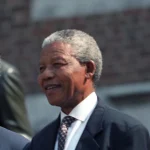“I was first imprisoned in Pretoria, and then, thereafter, I was taken to Robben Island. I stayed there for a couple of weeks. I was taken back to Pretoria when I was charged in the Rivonia trial, when I was then sent to Robben Island for life.”

Image credits: John Mathew Smith 2001,”From Wash D.C. Longworth building October 4, 1994. Mandela’s first trip to the United States.”,CC BY-SA 2.0,Nelson Mandela 1994 – Nelson Mandela – Wikipedia
- July 18, 1918 – December 5, 2013
- Born in South Africa
- Politician, lawyer
- The first black president of South Africa, he was awarded the Nobel Peace Prize for abolishing apartheid and building a democratic South Africa where multiple ethnic groups coexist.
table of contents
Quote
“I was first imprisoned in Pretoria, and then, thereafter, I was taken to Robben Island. I stayed there for a couple of weeks. I was taken back to Pretoria when I was charged in the Rivonia trial, when I was then sent to Robben Island for life.”
Explanation
This quote provides a brief chronology of Nelson Mandela’s imprisonment, touching on key events in his life as a political prisoner under apartheid. Mandela was first arrested in Pretoria in 1962 and later transferred to Robben Island, one of the most infamous prisons in South Africa. His initial time on Robben Island was short, but he was later brought back to Pretoria after being charged in the Rivonia Trial of 1963-1964. The trial, where Mandela and other leaders of the African National Congress (ANC) were charged with sabotage and conspiracy to overthrow the government, ended with a life sentence for Mandela. He was then sent back to Robben Island to serve his prison term, which would last for 18 years, marking the beginning of his long years of incarceration.
Historically, this quote summarizes a pivotal moment in the struggle against apartheid. Mandela’s trial at Rivonia symbolized the determination of the anti-apartheid movement to continue their fight despite the brutal repression of the South African government. Mandela’s conviction in the Rivonia Trial was a turning point in his life and in the history of South Africa. While imprisoned, Mandela became a symbol of resistance to apartheid and his confinement only strengthened his resolve. His imprisonment on Robben Island became legendary, and it was here that he continued to develop his vision for a future democratic South Africa.
In modern times, Mandela’s long imprisonment remains a powerful symbol of sacrifice and resilience in the face of political oppression. His ability to maintain his leadership and principles while incarcerated inspired global movements for freedom and justice. Today, his experiences are frequently cited in discussions about prisoners of conscience, political imprisonment, and the power of nonviolent resistance. Mandela’s suffering during these years is also a reminder of the profound impact that a single individual can have on history, as his imprisonment was not just a personal hardship but also a rallying point for international efforts to dismantle apartheid.

